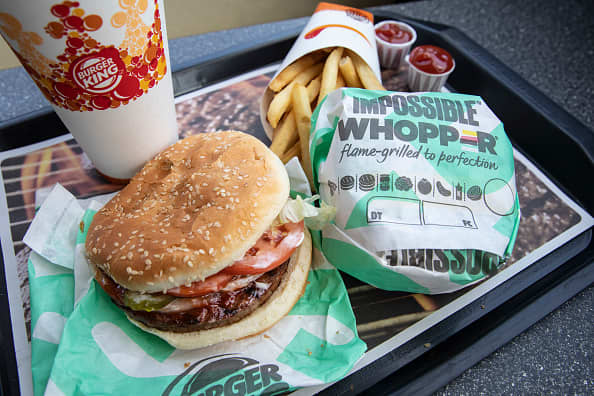
The meatless patties are produced by California tech startup Impossible Foods. A single Impossible Whopper sandwich costs $5.99.
Drew Angerer | Getty Images News | Getty Images
Burger King's Impossible Whopper may have built up buzz, but the plant-based burger wasn't enough to lift the chain's same-store sales growth as high as Wall Street estimates in the fourth quarter.
Analysts surveyed by Refinitiv were expecting the burger chain to report U.S. same-store sales growth of 3.1% in the quarter. Burger King fell short of those expectations, with sales at U.S. restaurants open at least 13 months only rising 0.6%.
Restaurant Brands International CEO Jose Cil attributed the weaker-than-expected results to running fewer value deals than the previous year, which saw U.S. same-store sales rise by 0.8%. Last month, the burger chain added the Impossible Whopper to its popular 2 for $6 promotion.
"As I mentioned, the Impossible Whopper was a big highlight of 2019 and continued to be an important sales driver in the fourth quarter, generating healthy levels of incrementality at a premium price point," Cil told analysts on a conference call Monday.
The language was a departure from last quarter when the company said the product was a strong contributor to Burger King's U.S. same-store sales growth of 5% after launching nationally in August. Executives said then that the item was bringing back customers who had not returned in a while, as well as younger consumers. Restaurant Brands does not break out the sales results for the Impossible Whopper.
Amid declining traffic trends across the fast-food industry, restaurant chains have turned to realistic meat alternatives from Beyond Meat and Impossible Foods to attract customers trying to cut back on their meat consumption due to health or environmental concerns.
But it's unclear how much the products are gaining traction and whether they can be a significant driver of sales. Burger King's largest U.S. franchisee, Carrols Restaurant Group, said in January that average daily orders of the Impossible Whopper at one of its locations had dropped by 32 to 28. In comparison, one of its restaurants typically sells about 234 beef Whoppers a day.
Rival McDonald's has been slow to jump on the meatless trend, citing the increased complexity of adding the menu to items and uncertainty around its long-term appeal. It's been testing a burger made with a Beyond patty in restaurants in southwestern Ontario.
Tim Hortons, which has seen slowing sales growth in its home market of Canada, introduced a breakfast sandwich made with Beyond's meatless sausage and a burger with its meat-free patty in July. By autumn, the Canadian coffee chain, also owned by Restaurant Brands, had yanked the breakfast sandwich from the majority of provinces. In late January, it disappeared from menus altogether.
"Ultimately, the product was not embraced by our guests as we thought it would be. We may offer plant-based alternatives again in the future, but we have removed it from the menu for now," a Tim Hortons spokesman said in a January statement.
Burger King's Impossible Whopper typically sells for $1 to $2 more than a beef Whopper. On Monday, Cil acknowledged that could be a hurdle to adoption.
"We know that the premium price point has limited some guests from trying the Impossible Whopper," Cil said.
Shares of Restaurant Brands jumped 2% in morning trading on Monday after the company reported earnings and revenue that topped analysts' estimates, helped by the success of the Popeyes chicken sandwich.
Read More
